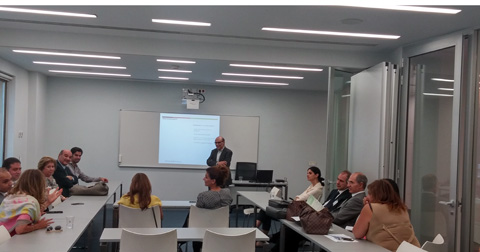What’s Your Story?
The importance of the family narrative in reinforcing the core values of the family business identity.

It is commonly admitted in this day and age that in order to succeed, corporations are compelled to invest in their brand identity and be consistent in their representations. They rely on branding and on creating a unique identity or “personality” that resonates in people’s minds, so as to be effectively differentiated from their competitors.
In his presentation entitled “Family Business Identity: Oral History Communication” organized by the Institute of Family and Entrepreneurial Business on June 25, 2015, Mr. Ramzi Rassi showed attendees of the Family Business Network how the narrative had a crucial role in sustaining and instilling the core values of the family identity, hence having a major impact on the business’ image and conduct.
“Always preserve the core!” as assertively advised by Rassi, UK-based multi-disciplined film and tv producer as well as communication consultant.
In his opening statement, Rassi explained that any kind of businesses should do their best, even “go out of their way” to preserve their core values, while also striving for adaptability, progress and consistency.
The family business is no exception to the rule – in order to differentiate itself, overcome obstacles and increase its chances of long-term success the family business has to consolidate its identity. The most effective tool is by re-telling the family narrative, according to Rassi.
How would family businesses benefit by consolidating their identity?
To answer that, Rassi listed internal and external advantages – internal ones included fostering cohesion within the family, representing a unifying focal point, providing guidance and long-term direction, self pride and the most noteworthy would be increasing the odds of the family’s survival and overcoming difficulties; external advantages would be brand benefits, customer trust and the general importance of communicating identity to the business’ stakeholders.
“Statistics show that the first generations of businesses are better at overcoming obstacles due to their deeply rooted core values. Communicating identity and instilling it in younger generations helps them overcome setbacks”, Rassi explained.
To him, the identity is very crucial – it represents a power which counteracts all other centrifugal forces that the family business might face. It’s the glue that unites the family and business, hence unifying the image to the outside world.
So what composes the identity and how do we achieve this powerful bond?
Core values! According to Rassi they are the primary constituent of identity, are set by the founder’s legacy and help instill abstract values in the business’ younger generation.
Just how do we introduce or consolidate these core values, so they become second-nature and preserve the identity?
“The narrative, of course” as Rassi argued.
The narrative’s importance lies in its representation of the historical background of the family, with stories of the founders’ activities pinpointing the positive moments. The stories are transmitted by members of the family or close partners of the founders, and their role is to inspire and engage the younger generation, while pulling closer people/customers who might identify with the business’ identity; it also reinforces pride and unites the family, driving the latter to be more harmonious towards a main goal. For these reasons and more Rassi proclaims the narrative as the most effective tool for communicating identity and core values, therefore instilling and strengthening the family business identity.
In that respect, Rassi urged to preserve family narratives, as they would erode with the passage of time, especially with globalization and with the fast-paced world of today. He showed the attendees the phases of oral history communication, the different stages, from collecting information and interviewing witnesses or relatives, to putting it all together and producing an inspiring piece, to the examples of forms by which the narrative could be presented, such as documentary, coffee table book, biography or TV program.
The subject was deemed interesting and debatable as many attendees participated in a discussion with Rassi and each other, adding their point of view and exploring the topic into its details, verifying that indeed, “to each his own story”.
If you would like to be part of the Family Business Network click here
More information on the Family Business Network? send us an e-mail at aksob@lau.edu.lb